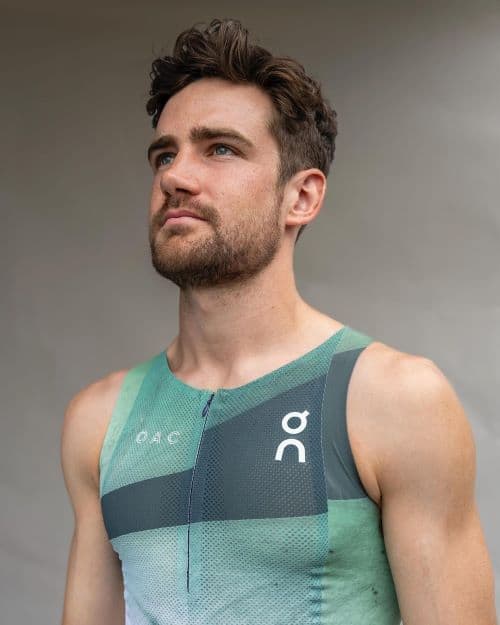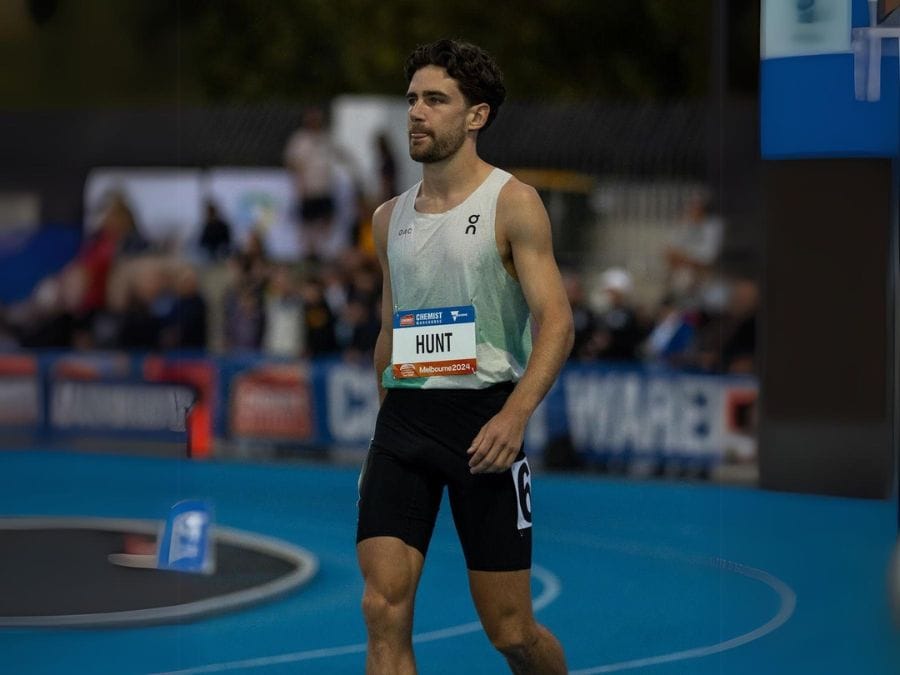In our RT Snap Q&A series, we’ve had the privilege of interviewing some of the world’s best runners, delving into their extraordinary journeys, celebrating their achievements, and exploring the unwavering dedication that defines their careers.
Jesse Hunt
- Born July 28, 1998
- Nationality: Australian
- Middle-distance runner
Jesse trained at the University of North Carolina, where he honed his skills and competed at the collegiate level before returning to Australia. After his return, he joined the OAC Oceania team under the guidance of renowned coach Craig Mottram. This move was a significant step in his career, allowing him to train with some of Australia’s top runners.
In March 2024, Hunt won the Australian Championship mile title at the Albie Thomas Mile in Bankstown, finishing with a time of 3:59.09. This victory was particularly notable as he narrowly defeated Jack Anstey, showcasing his strong finishing speed with a 54-second final lap.

Personal Bests
- 1500 Metres – 3:33.64
- Mile Short (indoor) – 3:58.46
- 800 Metres Short (indoor) – 1:50.91
- 1000 Metres – 2:26.27
- 5000 Metres – 14:18.45
- 3000 Metres Short (indoor) – 8:47.69
- Distance Medley Short (indoor) – 9:33.68
- Mile – 3:53.78
- 3000 Metres – 8:00.21
- 800 Metres – 1:50.72
- 1000 Metres Short (indoor) – 2:26.27
- 2000 Metres – 5:31.16
- 400 Metres – 51.11
RT: What were some key moments or turning points in your career that shaped you as an athlete?
Jesse: My running career so far has been characterised by a series of small breakthroughs that have snowballed into slightly bigger breakthroughs and opportunities, and so on. It feels like it’s taken some time to get to this point, but I try to remember that everyone is on a different journey and timeline in their development as an athlete. Back in 2018, I was recruited to run for UNC (the University of North Carolina). It was a great opportunity to get an education as well as train and race in a high-level environment, but it was a big change for me and it took me some time to adjust to the training and way of life.
In my sophomore year (year 2) Coach Chris Miltenberg left Stanford and came to North Carolina, inheriting our team. He believed in me and was instrumental in my development, but we had significant work to do to make up for lost time in my first year, building mileage and strength sensibly, yet progressively throughout the next three years. Throughout college, and with encouragement from Milt, I believed that a pro career could be possible, but it wasn’t until my fifth year that I made a significant breakthrough and ran 3:37, where that goal became feasible.

About 18 months before I was set to graduate, Craig Mottram reached out and informed me of his vision to build a pro team in Australia. As time went on, we stayed in close contact as I was exploring my options for a pro career. It has been incredibly encouraging to know that someone of Craig’s calibre believed in me and, along with On, has provided a great opportunity to continue a career in Australia.
Throughout my first year with On, I’ve been able to train harder than ever, leaving the stresses of college work behind. Domestically, I was able to run PB’s of 3:53 in the Mile and 3:33 in the 1500m and win the Australian Mile Championships, along with a bronze medal in the 1500m at the Australian Championships. I gained valuable experience in my first European season too, all of which I hope to build on in the coming years.
RT: What are some of the most important aspects of your training regimen that have contributed to your recent success?
Jesse: For me, moving to Melbourne has allowed me to focus entirely on my training with the infrastructure provided. I’ve been able to run more than ever, and have spent blocks of time training at Falls Creek, building endurance and improving my aerobic capacity. Additionally, a continued emphasis on strength work—particularly through threshold training, long hills, and longer reps—has started to address key areas of weakness, but there remains more work to be done. I’ve been able to prioritize recovery and pre-habilitation in the OAC gym in Richmond with our physio, Robbie O’Donnell, and spend much of the rest of my day recovering.
View this post on Instagram
RT: Could you describe a typical training week for you? How do you balance different types of workouts?
Jesse: On a standard week of training, I’ll do a double run (60min/30min) and strides on Monday, a V02 session on a Tuesday with a double, a medium-long run on Wednesdays, a threshold session and a double on Thursdays, an easy recovery run on Fridays, track reps or hills on Saturdays and a long run on Sunday. That comes out to around 140-150kms total per week. We’re quite flexible though and often change our structure, tailoring our weeks to current needs depending on the time of year.
RT: Can you share a memorable race or moment in your career that stands out to you?
Jesse: A big goal going into 2024 was to be competitive at the Australian Nationals, especially in such a big year, and to come out winning a bronze medal was pretty special. It’s exciting to be competing at the top end of the sport, alongside guys I had looked up to like Ollie and Stewy for so long. While it’s not the end goal, and to be frustratingly close to the higher medals, it was still great to put a domestic season together that culminated in some senior silverware.
View this post on Instagram
RT: How do you handle pressure and expectations, especially when competing in major championships?
Jesse: Throughout my college career, I raced a lot and found that my best performances came when I was loose and excited about just competing and seeing what I could do. Even though now the expectations and pressure may have risen, I think remembering how fun it is to compete and win is so important. It can be easy to get ahead of yourself, to blow things out of proportion and extrapolate – and as athletes, we place much of our self-worth in our performances. I’m continuing to try to be the same person each day in training or at a race, and hope that if I can do that, there’s never a need to step up or rise to the occasion.
RT: Looking further ahead, what are your long-term aspirations in running and athletics?
Jesse: I’m focused on continuing to progress toward making international teams, a significant challenge in one of the most competitive events in Australian athletics. I know I need to get stronger, faster and more consistent. My mindset is to try to win as much as possible, and if I can do that, the rest should take care of itself over time. The support of On and the OAC so far have been incredible.
